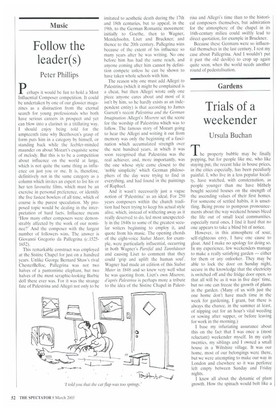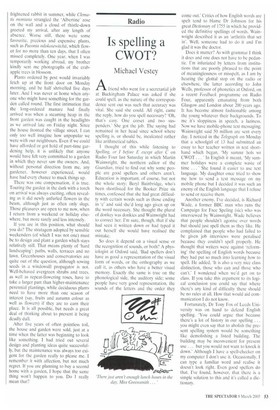Trials of a weekender
Ursula Buchan
The property bubble may be finally popping, but for people like me, who like staying put, the recent hike in house prices, in the cities especially, has been peculiarly painful. I, who live in a less popular locality, have watched, with consternation, as people younger than me have blithely bought second houses on the strength of the ascending values of their first homes. For someone of settled habits, it is unsettling. Being prone to pompous pronouncements about the way weekend houses bleed the life out of small local communities, especially rural ones, I find it hard that no one appears to take a blind bit of notice.
However, in this atmosphere of sour, self-righteous envy, I have one cause to gloat. And I make no apology for doing so. In my experience, few weekenders manage to make a really satisfying garden — either for them or any onlooker. They may be able to lock the door on Sunday night, secure in the knowledge that the electricity is switched off and the fridge door open, so that all will be as it was in five days' time, but no one can freeze the growth of plants in the garden. (Many of us with just the one home don't have much time in the week for gardening, I grant, but there is always the chance, in the summer at least, of nipping out for an hour's vital weeding or sowing after supper, or before leaving for work in the morning.) I base my infuriating assurance about this on the fact that I was once a (most reluctant) weekender myself. In my early twenties. my siblings and I owned a small house in a Wiltshire village. It was our home, most of our belongings were there, but we were attempting to make our way in London and elsewhere so it was perforce left empty between Sunday and Friday nights.
I knew all about the dynamic of plant growth. How the spinach would bolt like a
frightened rabbit in summer, while Clematis montana strangled the 'Albertine' rose on the wall and a cloud of thistle-down greeted my arrival, after any length of absence. Worse still, there were some favourite, precious and expensive plants, such as Paeonia mlokosewitchii, which flower for no more than ten days, that I often missed completely. One year, when I was temporarily working abroad, my brother kindly sent me photographs of the crabapple trees in blossom.
Plants ordered by post would invariably fetch up at the front door on Monday morning, and be half shrivelled five days later. And I was never at home when anyone who might have something for the garden called round. The first intimation that the long-ordered manure had finally arrived was when a steaming heap in the front garden was caught in the headlights as we arrived late on Friday night. Since the house fronted the village street, I can only too well imagine how unpopular we were with our neighbours. Even if we could have afforded or got hold of part-time gardening help, it is unlikely that anyone would have felt very committed to a garden in which they never saw the owners. And, without personal direction from me, any gardener, however experienced, would have had every chance to muck things up.
There was one compensation, it is true. Touring the garden in the dark with a torch on arrival was always exciting, often revealing as it did newly unfurled flowers in the beam, although just as often only slugs. Those pleasures are open to me now, when I return from a weekend or holiday elsewhere, but more rarely and less intensely.
If you are in this position, what should you do? The stratagem adopted by sensible weekenders (of which I was not one) must be to design and plant a garden which stays relatively still. That means plenty of 'hard landscaping': paths, walls, terraces and no lawn. Greenhouses and conservatories are quite out of the question, although sowing seeds in a windowsill propagator is not. Well-behaved evergreen shrubs and trees, as well as repeat-flowering roses, have to take a larger part than higher-maintenance perennial plantings, while deciduous plants need to have more than one season of interest (say, fruits and autumn colour as well as flowers) if they are to earn their place. It is all possible, but needs a great deal of thinking about to prevent it being deadly dull.
After five years of often pointless toil, the house and garden were sold, just at a time when the latter was beginning to look like something. I had tried out several design and planting ideas quite successfully, but the maintenance was always too exigent for the garden really to please me. I remember it with affection, but not much regret. If you are planning to buy a second home with a garden, I hope that the same thing won't happen to you. Do I really mean that?



































































 Previous page
Previous page